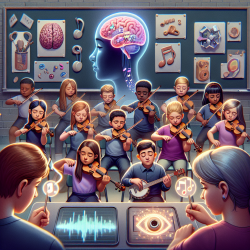Introduction
In the realm of speech-language pathology, creating optimal learning environments for children is a top priority. With classroom noise being a common challenge, researchers have long sought ways to enhance children's ability to perceive speech amidst noise. A recent study titled Investigating the Effect of One Year of Learning to Play a Musical Instrument on Speech-in-Noise Perception and Phonological Short-Term Memory in 5-to-7-Year-Old Children explores whether musical training could be the key to unlocking these skills.
The Study
This longitudinal study involved 41 children aged 5-7 years, split between a music-focused school and a sports-focused school. The research aimed to determine if one year of musical training could improve speech-in-noise (SiN) perception and phonological short-term memory.
Contrary to some expectations, the study found no significant advantage for the music-trained group in terms of SiN perception or phonological short-term memory when compared to their sports-focused peers. These findings challenge the notion that limited musical training can enhance these cognitive abilities.
Implications for Practitioners
While the study didn't find a significant musicians' advantage, it doesn't close the door on the potential benefits of musical training. Practitioners should consider the following:
- Evaluate the intensity and duration of musical training: The study suggests that longer and more intensive musical training might be necessary to observe cognitive benefits.
- Consider individual differences: Children's baseline cognitive abilities and motivations can influence the outcomes of musical training.
- Explore alternative interventions: While musical training is a promising area, other interventions might also enhance SiN perception and memory.
Encouraging Further Research
The study highlights the need for further research to explore the conditions under which musical training might enhance cognitive skills. Future studies should consider:
- Longer training durations and varied musical activities.
- Randomized controlled trials to minimize bias.
- Exploring the role of individual differences in training outcomes.
Conclusion
While the current study did not find significant cognitive benefits from one year of musical training, it opens the door for further investigation. Speech-language pathologists should remain open to integrating musical elements into their practice while advocating for more comprehensive research in this area.
To read the original research paper, please follow this link: Investigating the Effect of One Year of Learning to Play a Musical Instrument on Speech-in-Noise Perception and Phonological Short-Term Memory in 5-to-7-Year-Old Children.










